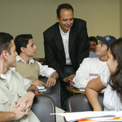|
|
 |
 |
 |
 |
|
 |
|
 |
|
 |
 |
 |
|
 |
|
 |
|
 |
|
|
|
 |
|
|
 |
|
|
|
Department of Computer Science
School of Sciences and Engineering
Professors: A. Goneid, A. Khalil, M. N. Mikhail (Chair), A. Rafea
Associate Professors: A. Abdel Bar, A. El Kadi, A. S. Mohamed, M. Mahmoud
Assistant Professors: K. El-Ayat, A. Zeid, M. Mudawwar, S. El-Kassas
Computer science as described by CAC (the Computing Accreditation Commission) is "the body of knowledge concerned with computers and computation. It has theoretical, experimental, and design components and includes (1) theories of understanding computing devices, programs, and systems; (2) experimentation for the development and testing of concepts; (3) design methodology, algorithms, and tools for practical realization; and (4) methods of analysis for verifying that these realizations meet requirements."
|
|
|
|
Bachelor of Science
The undergraduate program in Computer Science at AUC is accredited by CAC. The objectives of the program are: to provide a coherent and broad-based coverage of the discipline of computing and to prepare students for entry into the computing profession, for graduate studies in the field and for meeting the general challenges of their professional and personal life in a field where radical change is the norm.
The course of study offers a broad-based intellectual engagement with computing both in theory and practice as well as logic and capabilities. The theoretical ground, abstraction, design as well as the professional practice levels (technical competence, team work, problem solving and communication skills), social and ethical contexts of the discipline of computing are well integrated into the curriculum that the department offers.
The study program is designed to prepare students for a wide variety of careers. The most profound positions that our graduates are well prepared to occupy (or have already been engaged in) may be classified into the following professional disciplines: Software Engineering, Systems Design and Programming, Applications design and programming and Information-Systems design and analysis. The program also prepares students for further studies and research in the computing field.
A total of 142 credits is required for a bachelor's degree in computer science:
Core Curriculum (40 credits)
Computer Science Requirements (60 credits):
a) Concentration Requirements (41 credits) |
|
|
CSCI |
106 |
Fundamentals of Computer Science, 3 cr. |
| |
110 |
Programming Fundamentals, 3 cr. |
|
CSCI |
210 |
Data Structures and Algorithms, 3 cr. |
| |
230 |
Digital Logic Design, 3 cr. |
| |
239L |
Digital Logic Design Lab, 1 cr. |
| |
231 |
Computer Organization & Assembly Language Programming, 3 cr. |
| |
321 |
Analysis & Design of Algorithms, 3cr |
| |
325 |
Concepts of Programming Languages, 3cr. |
| |
330 |
Computer Architecture, 3 cr. |
| |
339L |
Computer Architecture Lab, 1 cr. |
| |
341 |
Software Engineering, 3 cr. |
| |
345 |
Operating Systems, 3 cr. |
| |
422 |
Theory of Computing, 3 cr. |
| |
447 |
Compiler Design, 3 cr. |
| |
491 |
Senior Project I, 1 cr. |
| |
492 |
Senior Project II, 2 cr. |
|
|
|
b) Computer Science electives (19 credits)
To be chosen in consultation with the student's advisor from the following: |
|
|
CSCI |
253 |
Fundamentals of Database Systems, 3 cr. |
| |
315 |
Programming Language, 1-2 cr. |
| |
317 |
Object Oriented Programming, 3 cr. |
| |
333 |
Data and Computer Communications, 3 cr. |
| |
356 |
Systems Simulation, 3 cr. |
| |
358 |
Systems Analysis and Design, 3 cr. |
| |
427 |
Introduction to Artificial Neural Networks, 3 cr. |
| |
430 |
Computer Hardware Design and Applications, 3 cr. |
| |
435 |
Wide Area Networks, 3 cr. |
| |
437 |
Local and Metropolitan Area Networks, 3 cr. |
| |
441 |
Object-Oriented Analysis and Design, 3 cr. |
| |
445 |
Fundamentals of Distributed Systems, 3 cr. |
| |
446 |
Computer Security |
| |
453 |
Database Systems, 3 cr. |
| |
455 |
Computer Graphics, 3 cr. |
| |
465 |
Artificial Intelligence, 3 cr. |
| |
485 |
Selected Topics in Computer Science, 3 cr. |
| |
490 |
Industrial Training, 1 cr. |
| |
495 |
Guided Studies in Computer Science, 1-3 cr. |
|
MATH |
304 |
Numerical Methods, 3 cr. |
|
|
|
Collateral Requirements (31 credits) |
|
|
PHYS |
111 |
Classical Mechanics, Sound and Heat, 3 cr. |
| |
112 |
Electricity and Magnetism, 3 cr. |
| |
123L |
General Phys. Lab I, 1 cr. |
| |
124L |
General Phys. Lab II, 1 cr. |
| |
215 |
Introduction to Circuit Analysis and Devices, 3 cr. |
| |
221L |
Intermediate Physics Lab I, 2 cr. |
|
MATH |
132 |
Calculus & Analytic Geometry II, 3 cr. |
| |
200 |
Discrete Mathematics, 3 cr. |
| |
231 |
Calculus & Analytic Geometry, III, 3 cr. |
| |
233 |
Differential Equations, 3 cr. |
| |
303 |
Linear Algebra, 3 cr. |
| |
306 |
Applied Probability I, 3 cr. |
|
|
|
Electives (15 credits)
Minor
A minor in Computer Science provides students from other disciplines with basic knowledge and practice in computing that would enable them to develop simple or advanced applications in their field of study.
A minor in Computer Science is comprised of 15 credits. Students select the sequence of computer science courses, with the help of their advisor, according to their needs and interests. The choice should include at least 9 credits out of the Computer Science concentration requirements and should not include CSCI 315. Students are required to plan their courses such that no more than six Computer Science credits are taken in one semester.
Recommended Options for Minor:
Theoretical Aspects in Computer Science: Recommended for Math major students: CSCI 106, 110, 210, 321 & 422.
Data Base Systems: Recommended for Business, Economics & Engineering majors students: CSCI 106, 110, 210, 253 & 453.
Computer Systems: Recommended for Physics, Mechanical & Construction majors students but not permitted for Electronic Engineering major: CSCI 106, 110, 210, 230 & 231.
Embedded Systems: Recommended for Electronics Engineering major students only: CSCI 106, 210, 345 & 430.
Computer Science Courses (CSCI) |
|
|
|
|
|
